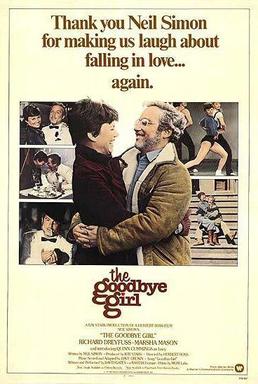
The Goodbye Girl is a 1977 American romantic comedy-drama film directed by Herbert Ross, written by Neil Simon and starring Richard Dreyfuss, Marsha Mason, Quinn Cummings and Paul Benedict. The film, produced by Ray Stark, centers on an odd trio of characters: a struggling actor who has sublet a Manhattan apartment from a friend, the current occupant, and her precocious young daughter.
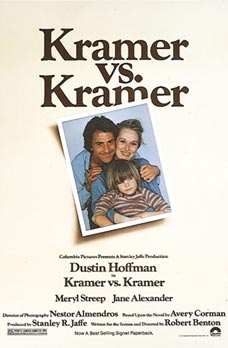
Kramer vs. Kramer is a 1979 American legal drama film written and directed by Robert Benton, based on Avery Corman's 1977 novel of the same name. The film stars Dustin Hoffman, Meryl Streep, Jane Alexander, and Justin Henry. It tells the story of a couple's divorce, its impact on their young son, and the subsequent evolution of their relationship and views on parenting.
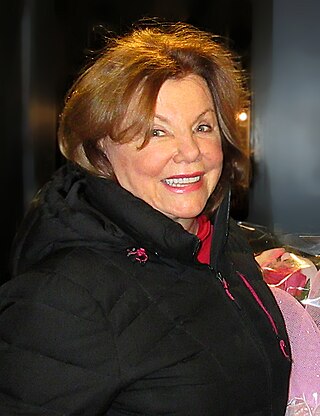
Marsha Mason is an American actress and director. She has been nominated four times for the Academy Award for Best Actress: for her performances in Cinderella Liberty (1973), The Goodbye Girl (1977), Chapter Two (1979), and Only When I Laugh (1981). The first two films also won her Golden Globe Awards. She was married for ten years (1973–1983) to the playwright and screenwriter Neil Simon, who was the writer of three of her four Oscar-nominated roles.

Cinderella Liberty is a 1973 American drama film adapted by Daryl Ponicsan from his 1973 novel of the same title. The film tells the story of a sailor who falls in love with a prostitute and becomes a surrogate father for her 10-year-old mixed race son. The film stars James Caan, Marsha Mason and Eli Wallach, and was produced and directed by Mark Rydell.

Chapter Two is a semi-autobiographical play by Neil Simon. The play premiered on Broadway in 1977, where it ran for 857 performances.

Only When I Laugh is a 1981 American comedy-drama film based on Neil Simon's 1970 play The Gingerbread Lady.

James Edmund Caan was an American actor. He came to prominence playing Sonny Corleone in The Godfather (1972) – a performance which earned him Academy Award and Golden Globe nominations for Best Supporting Actor. He reprised his role in The Godfather Part II (1974). He received a motion pictures star on the Hollywood Walk of Fame in 1978.

The Gambler is a 1974 American crime drama film written by James Toback and directed by Karel Reisz. It stars James Caan, Paul Sorvino, and Lauren Hutton. Caan's performance was widely lauded and was nominated for a Golden Globe.

Funny Lady is a 1975 American biographical musical comedy-drama film and the sequel to the 1968 film Funny Girl. The film stars Barbra Streisand, James Caan, Omar Sharif, Roddy McDowall and Ben Vereen.
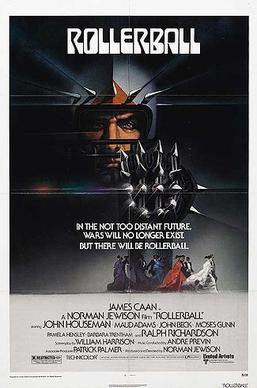
Rollerball is a 1975 dystopian science fiction sports film directed and produced by Norman Jewison. It stars James Caan, John Houseman, Maud Adams, John Beck, Moses Gunn and Ralph Richardson. The screenplay, written by William Harrison, adapted his own short story "Roller Ball Murder", which had first appeared in the September 1973 issue of Esquire.

Thief is a 1981 American neo-noir heist action thriller film directed and written by Michael Mann in his feature film debut and starring James Caan in the title role, a professional safecracker trying to escape his life of crime, and Tuesday Weld as his wife. The supporting cast includes James Belushi, Robert Prosky, Dennis Farina, and Willie Nelson. The screenplay is inspired by the book The Home Invaders: Confessions of a Cat Burglar, a memoir by former cat burglar Frank Hohimer. The original musical score was composed and performed by Tangerine Dream.
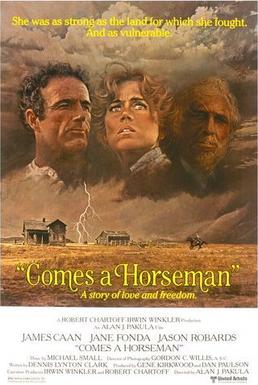
Comes a Horseman is a 1978 American Western drama film starring Jane Fonda, James Caan, Jason Robards, and Richard Farnsworth, directed by Alan J. Pakula.

Seems Like Old Times is a 1980 American comedy film starring Chevy Chase, Goldie Hawn, and Charles Grodin, directed by Jay Sandrich and written by Neil Simon. It was the only theatrical film directed by Sandrich, who was best known for his television sitcom directing work.
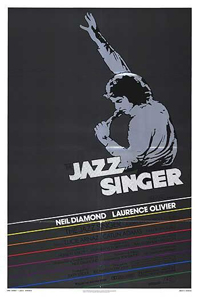
The Jazz Singer is a 1980 American musical drama film directed by Richard Fleischer and produced by Jerry Leider. The film stars Neil Diamond, Laurence Olivier and Lucie Arnaz, and tells the story of a young singer who is torn between tradition and pursuing his dreams as a pop singer. Based on the 1925 play of the same name by Samson Raphaelson, it is the fourth film adaptation, following the 1927 and the 1952 theatrical adaptions, and a 1959 television adaptation.

The Gang's All Here is a 1943 American Twentieth Century Fox Technicolor musical film starring Alice Faye, Carmen Miranda and James Ellison. The film, directed and choreographed by Busby Berkeley, is known for its use of musical numbers with fruit hats. Included among the 10 highest-grossing films of that year, it was at that time Fox's most expensive production.
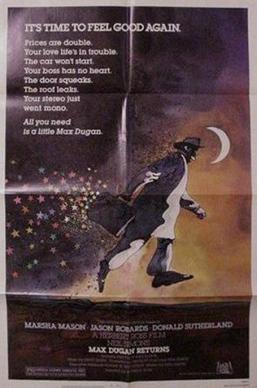
Max Dugan Returns is a 1983 American comedy drama film written by Neil Simon and directed by Herbert Ross. It stars Marsha Mason, Jason Robards in the title role, Donald Sutherland, and Matthew Broderick. This also features Donald’s son, Kiefer Sutherland, in his debut.

Harry and Walter Go to New York is a 1976 American period comedy film written by John Byrum and Robert Kaufman, directed by Mark Rydell, and starring James Caan, Elliott Gould, Michael Caine, Diane Keaton, Charles Durning and Lesley Ann Warren. In the film, two dimwitted con-men try to pull off the biggest heist ever seen in late nineteenth-century New York City. They are opposed by the greatest bank robber of the day, and aided by a crusading newspaper editor.

Neil Simon's Last of the Red Hot Lovers is a 1972 American comedy film based on Neil Simon's 1969 play of the same name. Alan Arkin, Sally Kellerman, Paula Prentiss and Renée Taylor star in it.

Brighton Beach Memoirs is a 1986 American comedy film directed by Gene Saks, written by Neil Simon, and starring Jonathan Silverman and Blythe Danner. The film is adapted from Simon's semi-autobiographical 1982 play of the same title, the first chapter of what is known as the Eugene trilogy, followed by the adaptations Biloxi Blues and Broadway Bound.

Batteries Not Included is a 1987 American science fiction comedy film directed by Matthew Robbins about small extraterrestrial living spaceships that save an apartment block under threat from property development. The story was originally intended to be featured in the television series Amazing Stories, but executive producer Steven Spielberg liked the idea so much that he decided to adapt it into a film. It was the feature film screenwriting debut of Brad Bird.




















